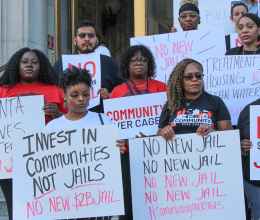(Atlanta, GA) — Today, the Southern Center for Human Rights and the ACLU of Georgia moved to dismiss Jones v. Hill, a lawsuit about COVID precautions filed on behalf of people detained in the Clayton County Jail. The litigation, which was filed in July of 2020, asked the court to require jail officials to take immediate steps to prevent and mitigate the rapid spread of COVID-19 in the jail. While the lawsuit is being dismissed based on the shift in pandemic circumstances, the dire conditions and dangers inside the Clayton County Jail persist, and the people caged inside remain unsafe.
Jones v. Hill
When Jones v. Hill was filed in 2020, COVID-19 was spreading quickly through Georgia prisons and jails. Declarations from incarcerated people showed that Clayton County Jail staff and administrators were ignoring and neglecting to treat people who reported COVID-19 symptoms; failing to isolate infected people; test many people; provide face masks; provide enough soap or cleaning supplies; or to enforce any semblance of social distancing measures. One plaintiff, who was 72 and had a heart condition, had to use a homemade mask made of underwear, which he purchased from another man for two soup packets. As a result of Jones v. Hill, the jail implemented some measures to address the spread of COVID-19, including the dissemination of PPE, increased access to testing and vaccines.
Despite these small improvements to the jail’s COVID-19 response, people inside remain unsafe and forced to live in filthy, inhumane conditions. People sleep three to a cell meant for two, meaning someone sleeps on the floor, next to broken toilets and sinks, surrounded by molds, roaches, spiders, ants, gnats, bed bugs, and lice. At times, dorms housing 48 people have access to only one phone and one shower. No one is allowed time outside or offered any other kind of recreation. Some units are on a book ban, so that no one can receive reading material. In just 2022 so far, at least 6 people have died at the Clayton County Jail–the second-highest number of deaths in any metro Atlanta jail.
“The public needs to know what a terrifying and unsafe place the Clayton County Jail is,” said Jamie Mills, who spent time at the jail during the pandemic. “People should know what is happening in their backyards, what is happening with their tax dollars. People are tortured in that jail.”
The priorities identified by people inside the jail are:
1. Staffing
a. The jail is dangerously understaffed. More staff must be hired, trained, and retained. Existing staff are not properly trained in assisting people with mental illnesses or de-escalating violence.
2. Hygiene
a. People in the jail need consistent access to laundry facilities, appropriate amounts of soap, cleaning supplies, and clean bedding. Currently, people are given 4 oz. of soap for an entire week. This is meant to be for personal hygiene, but because the facility is so dirty, people are forced to use the hand soap they are given to also clean their physical surroundings and laundry. Currently, people are allowed access to clean clothes only once per month. They are not given underwear unless they can purchase it from the commissary. Due to overcrowding, some people sleep on the floor, next to broken toilets.
3. Programming and Recreation
a. People in the jail are not allowed outside. They require fresh air and sunlight. They also need access to activities and programming. Since the onset of the COVID-19 pandemic more than two and a half years ago, access to televisions (in common areas) has been banned. Multiple dorms are on book bans, meaning no one can receive reading materials.
4. Conditions
a. People in the jail require the kiosks and phones in the dorms to be regularly maintained, so that they are functional. They are vital for both maintaining communication with loved ones and for filing grievances, the only recourse incarcerated people have to make formal complaints or requests. The jail must maintain the toilets, sinks, and showers so that they are usable, a move that is critical to public health and safety. The people in the jail also consistently live amongst vermin infestations (rodents, cockroaches, lice, scabies, spiders, ants, gnats), which the jail must work to mitigate and prevent.
“Former sheriff Victor Hill proudly presided over a culture of violence and cruelty at the Clayton County Jail, most dramatically illustrated by his recent federal convictions for human rights abuses there. But his absence has not significantly improved the material circumstances for people inside,” said Whitney Knox Lee, Staff Attorney at the Southern Center for Human Rights. “People in the Clayton County Jail still live in overcrowded, decrepit conditions exacerbated by unacceptable risks of violence and illness.”
“While this COVID-19 case is being dismissed, the squalid, dangerous, and inhumane conditions at CCJ remain. People incarcerated at CCJ continue to be housed in a filthy and cruel environment and continue to be at serious risk of harm. They and the communities from which they come—and to which they will return—remain threatened until the jail reckons with its practices and drastically reforms its conditions,” said Andrés López-Delgado, ACLU of Georgia staff attorney.
